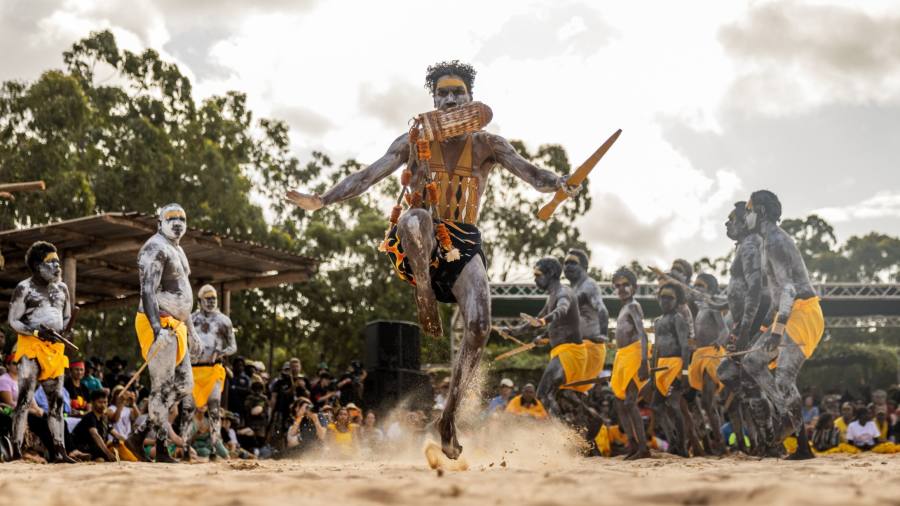Receive free Australian politics updates
We’ll send you a myFT Daily Digest email rounding up the latest Australian politics news every morning.
Hundreds of executives from Australia’s biggest banks, mining companies and retailers have travelled this weekend to the country’s remote north-east for the Garma Festival, a four-day celebration of indigenous life and culture.
Rio Tinto, Commonwealth Bank and others are expected to invite elders and community leaders to sit around campfires to discuss the October referendum on the “Voice”, a proposed amendment to the constitution that would recognise the indigenous population and establish an advisory body to parliament.
The increased business presence at Garma this year illustrates how companies are trying to navigate one of Australia’s most polarising debates in decades.
The recognition of the country’s 1mn First Nations people, who have long been victims of discrimination and prejudice, was one of Labor prime minister Anthony Albanese’s central election pledges. Its advocates say the Voice will allow indigenous voices to be heard on matters that affect them.
Opponents argue the plan lacks detail and say the Canberra-based advisory body will make little difference to the plight of indigenous communities. Some fear the amendment could divide the country along racial lines.
Miners BHP and Rio Tinto, oil and gas major Woodside Energy and retailers Woolworths and Coles have backed a “yes” vote, arguing that it is a positive step towards reconciliation with the indigenous population. BHP, Rio Tinto and Wesfarmers have each donated A$2mn ($1.3mn) to the “yes” campaign. Rio Tinto, Qantas and Telstra are also sponsors at Garma.
Michael Chaney, chair of the A$56bn retail-to-lithium conglomerate Wesfarmers, has gone a step further, warning in May that international investors were watching the vote closely and would question whether Australia was a “fair place” if a “no” vote prevailed.
There was government pressure to back a “yes” vote, with ministers “putting the hard word” on business leaders to publicly endorse the referendum, according to a person with direct knowledge of the situation. The government did not respond to a request for comment.
Peter Dutton, leader of the opposition Liberal party who is lobbying for a “no” vote, has criticised BHP, Rio Tinto and Wesfarmers for their donations.
“I think there’s frankly a lot of business leaders in our country today [that] need to reassess where they are on some of these debates,” Dutton told Sky News in July. Dutton accused business leaders of “craving popularity” on social media and trying to atone for past actions. Rio Tinto was widely criticised when it blew up sacred cave paintings at Juukan Gorge in May 2020.
Sean Gordon, a Wangkumarra-Barkindji man who is head of the Gidgee Group advisory business and a member of the referendum working group, said calls for business leaders to sit out the debate were inappropriate given the government had long urged Australian companies to improve relations with indigenous communities.
Gordon has worked directly with large companies including Commonwealth Bank, the country’s largest financial institution, and supermarket chain Woolworths to establish corporate advisory bodies on indigenous affairs. That has led to greater engagement on issues including employment, procurement and the provision of services such as banking to very rural communities, he said.
These kinds of initiatives could act as a template for the Voice, he said. “These structures aren’t foolproof, but when incidents do happen you can respond quickly and rectify the problem,” he said.
One senior corporate adviser, who did not want to be named because of the sensitivity of the subject, said some businesses were wary of involvement in politics. The person added that some boards were split, with non-executive directors from academia or ex-government roles more likely to push for full-throated support of the Voice than the more conservative chairs.
A poll held last month by Resolve showed the no vote ahead by a margin of 52 per cent to 48 per cent, making it a difficult line for businesses to navigate.
Big W, a discount variety goods retailer owned by Woolworths, this month withdrew loudspeaker announcements that expressed support for the vote after receiving “feedback” from its staff and customers.
Gordon also called for more support of indigenous staff as the referendum approaches, raising concerns about the potential for discrimination or attacks.
Companies have a role to play in educating their staff, he said, citing the example of Woolworths, many of whose 200,000 staff are young and will be voting for the first time.
“We are not telling them how to vote,” he said. “We need to inform them about what the referendum is and what the arguments are.”
Read the full article here




